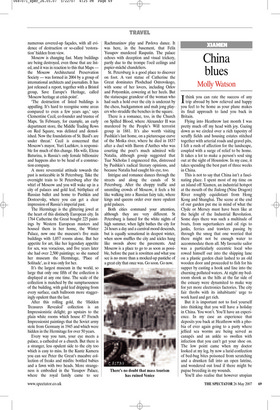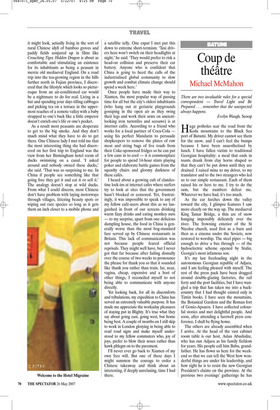China blues
Molly Watson
Ithink you can rate the success of any trip abroad by how relieved and happy you feel to be home as your plane makes its final approach to land you back in Britain.
Flying into Heathrow last month I was pretty much off my head with joy. Gazing down as we circled over a rich tapestry of scruffy fields and housing estates stitched together with arterial roads and gravel pits, I felt a rush of affection for the landscape, coupled with a surge of relief to be home. It takes a lot to make a person’s soul sing out at the sight of Hounslow. In my case, it takes spending the best part of three weeks in China.
This is not to say that China isn’t a fascinating place. I spent most of my time on an island off Xiamen, an industrial hotspot at the mouth of the Jiulong (Nine Dragon) River roughly equidistant from Hong Kong and Shanghai. The scene at the end of our garden put me in mind of what the Clyde or Mersey must have been like at the height of the Industrial Revolution. Some days there was such a multitude of boats, from supertankers and oil rigs to junks, ferries and trawlers passing by through the smog that one worried that there might not be enough water to accommodate them all. My favourite sailor was a particularly eccentric local who rowed himself out into the shipping lane on a plastic garden chair lashed to an old wooden door and proceeded to fish for his supper by casting a hook and line into the churning polluted waters. At night my bedroom shook as the hills at the far side of the estuary were dynamited to make way for yet more electronics factories. The city fair throbs with its inhabitants’ urge to work hard and get rich.
But it is important not to fool yourself into thinking that you will have a holiday in China. You won’t. You’ll have an experience. In my case an experience that deposits you back at Heathrow with a phobia of ever again going to a party where jellied sea worms are being served as canapés and an ankle so swollen with infection that you can’t get your shoe on. The low point came when my doctor looked at my leg, by now a lurid confection of bed-bug bites poisoned from scratching and a drunken fall into an open latrine, and wondered out loud if there might be pupae breeding in my wounds.
You’ll also realise that however utopian it might look, actually living in the sort of rural Chinese idyll of bamboo groves and paddy fields conjured up in films like Crouching Tiger, Hidden Dragon is about as comfortable and stimulating an existence for its inhabitants as being a peasant in merrie old mediaeval England. On a road trip into the tea-growing region in the hills further north in Fujian province, I discovered that the lifestyle which looks so picturesque from an air-conditioned car would be a nightmare to do for real. Living in a hut and spending your days tilling cabbages and picking tea on a terrace in the uppermost reaches of a remote valley with a baby strapped to one’s back like a little emperor doesn’t enrich one’s life or one’s pocket.
As a result most peasants are desperate to get to the big smoke. And they don’t much mind what they have to do to get there. One Chinese lady I met told me that the most interesting thing she had discovered on her first trip to England was the view from her Birmingham hotel room of ducks swimming on a canal. ‘I asked around and nobody owned these ducks,’ she said. ‘That was so surprising to me. In China if people see something like that going free they get it and eat it or sell it.’ The analogy doesn’t stop at wild ducks. From what I could discern, most Chinese don’t have problem with laying motorways through villages, littering beauty spots or wiping out rare species so long as it gets them an inch closer to a mobile phone and a satellite telly. One expat I met put this down to extreme short-termism. ‘Taxi drivers here won’t switch on their headlights at night,’ he said. ‘They would prefer to risk a head-on collision and preserve their car battery. Anyone who is confident that China is going to heed the calls of the industrialised global community to slow growth and combat climate change should spend a week here.’ Once people have made their way to Xiamen, the most popular way of passing time for all but the city’s oldest inhabitants (who hang out at geriatric playgrounds gossiping in the open air as they swing their legs and work their arms on ancientlooking iron turnstiles and seesaws) is at internet cafés. According to a friend who works for a local partner of Coca-Cola using his perfect Mandarin to persuade shopkeepers to remove the plates of raw meat and string bags of live toads from their Coke-sponsored fridges so he can put a few cans in to cool — it is commonplace for people to spend 14-hour stints playing poker and elaborate battle games from the squashy chairs and gloomy darkness of these cafés.
I heard about a growing cult of clandestine lock-ins at internet cafes where surfers try to look at sites that the government hasn’t blocked or censored. Yet, frustratingly, it was impossible to speak to any of my fellow café-users about this as we languished in front of our screens drinking warm fizzy drinks and eating monkey nuts — to my surprise, apart from one delicious dumpling house, the food in China is generally worse than the most bog-standard fare served up by Chinese restaurants in Britain. This lack of communication was not because people feared official reprisals. They might well have, but I never got that far because after failing dismally over the course of two weeks to pronounce the phrase for thank you so that it sounded like thank you rather than train, far, near, vagina, cheap, expensive and a host of other things, I reconciled myself to not being able to communicate with anyone directly.
Yet looking back, for all its discomforts and tribulations, my expedition to China has served an extremely valuable purpose. It has made me appreciate the workaday pleasures of staying put in Blighty. It’s true what they say about going east, going west, but home being best. A couple of months on I still skip to work in London glorying in being able to read road signs and make myself understood to my fellow commuters who, joy of joys, prefer to blow their noses rather than hawk phlegm on to the pavement.
I’ll never ever go back to Xiamen of my own free will. But one of these days I might summon the courage to order a Chinese takeaway and think about an interesting, if deeply unrelaxing, time I had there.



















































































 Previous page
Previous page